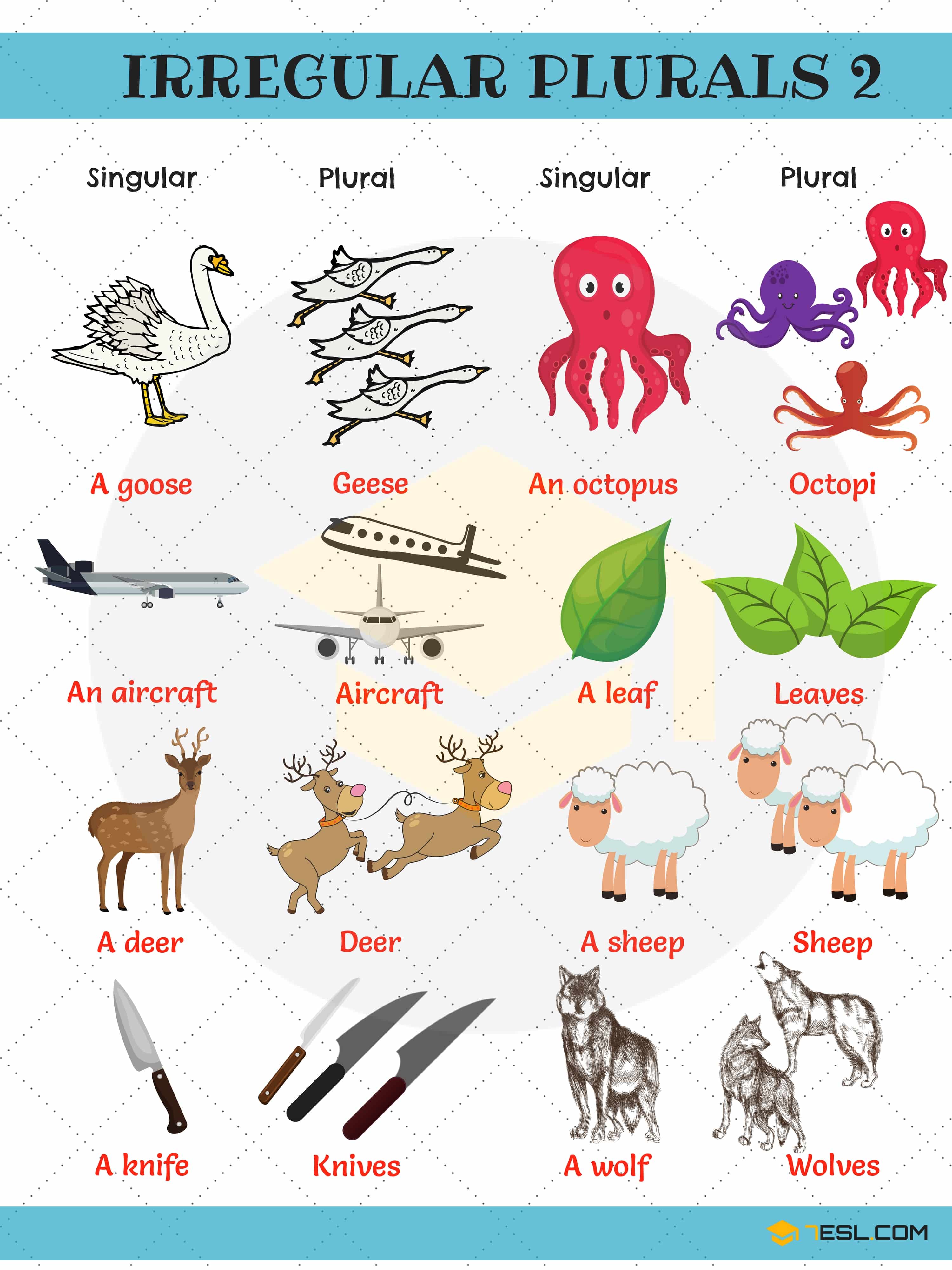What is an irregular plural noun? Learn important grammar rules related to Irregular Plural Nouns in English with lists, examples, and ESL infographics.
What Are Irregular Plural Nouns?
Irregular plural nouns don’t adhere to specific rules; therefore, it’s prudent to study them or search for accurate pluralization in the dictionary. Lack of definite rules makes it challenging to understand them. So, you must devote your time to study and memorize them. Otherwise, you’re bound to error when making use of irregular nouns in plural form.
Examples of irregular nouns in singular and plural format:
| Singular | Plural |
| Man | Men |
| Foot | Feet |
| Mouse | Mice |
| Child | Children |
| Woman | Women |
| Goose | Geese |
| Person | People |
Irregular Plural Nouns | Rules
No Change in the Plural
Some nouns have identical singular and plural. Many of these are the names of animals.
Irregular Plural Nouns List:
- Aircraft – aircraft
- Barracks – barracks
- Deer – deer
- Gallows – gallows
- Moose – moose
- Salmon – salmon
- Hovercraft – hovercraft
- Spacecraft – spacecraft
- Series – series
- Species – species
- Means – means
- Offspring – offspring
- Deer – deer
- Fish – fish
- Sheep – sheep
- Offspring – offspring
- Trout – trout
- Swine – swine
Changing the Spelling of the Singular Noun
The plural is sometimes formed by simply changing the vowel sound of the singular (these are sometimes called mutated plurals):
Irregular Plural Nouns List:
- Person – people
- Ox – oxen
- Man – men
- Woman – women
- Caveman – cavemen
- Policeman – policemen
- Child – children
- Tooth – teeth
- Foot – feet
- Goose – geese
- Mouse – mice
- Louse – lice
- Penny – pence
Note: There are many compounds of man and woman that form their plurals in the same way: postmen, policewomen, etc.
Irregular Nouns – Image 1

Irregular Plural Nouns from Latin and Greek
Final a becomes -ae (also -æ), or just adds -s
- Alumna – alumnae
- Formula – formulae/formulas
Final ex or ix becomes -ices
- Index – indices /indexes
- Matrix – matrices
- Vertex – vertices
- Appendix – appendices
Final is becomes es
- Axis – axes
- Genesis – geneses
- Nemesis – nemeses
- Crisis – crises
- Testis – testes
Final um becomes -a, or just adds -s
Irregular Plural Nouns List:
- Addendum – addenda
- Corrigendum – corrigenda
- Datum – data
- Forum – fora/forums
- Medium – media/ mediums
- Memorandum – memoranda/memorandums
- Millennium – millennia
- Ovum – ova
- Spectrum – spectra
Final us becomes -i or -era or -ora or just adds -es
Irregular Plural Nouns List:
- Alumnus – alumni
- Corpus – corpora
- Census – censuses
- Focus – foci
- Genus – genera
- Prospectus – prospectuses
- Radius – radii
- Campus – campuses
- Succubus – succubi
- Stylus – styli
- Syllabus – syllabi/syllabuses
- Viscus – viscera
- Virus – viruses/virii
- Cactus – cactuses/cacti
- Fungus – fungi
- Hippopotamus – hippopotamuses/hippopotami
- Octopus – octopuses
- Terminus – termini/terminuses
- Uterus – uteri/uteruses
Final us remains unchanged in the plural
- Meatus – meatus/meatuses
- Status – status/statuses
Final on becomes -a
- Automaton – automata
- Criterion – criteria
- Phenomenon – phenomena
- Polyhedron – polyhedra
Final as in one case changes to -antes
- Atlas – Atlantes (statues of the Titan); but Atlas – atlases (map collections)
Final ma in nouns of Greek origin can become -mata
Final ma in nouns of Greek origin can become -mata, although -s is usually also acceptable, and in many cases more common.
- Stigma – stigmata/stigmas
- Stoma – stomata/stomas
- Schema – schemata/schemas
- Dogma – dogmata/dogmas
- Lemma – lemmata/lemmas
- Anathema – anathemata/anathemas
Irregular Plural Nouns from Other Languages
Some nouns of French origin add an -x:
- Beau – beaux/beaus
- Bureau – bureaux/bureaus
- Tableau – tableaux/tableaus
Nouns of Slavic origin add -a or -i according to native rules, or just -s:
- Kniazhestvo – kniazhestva/kniazhestvos
- Kobzar – kobzari/kobzars
- Oblast – oblasti/oblasts
Nouns of Hebrew origin add -im or -ot (generally m/f) according to native rules, or just -s:
- Cherub – cherubim/cherubs
- Seraph – seraphim/seraphs
- Matzah – matzot/matzahs
- Kibbutz – kibbutzim/kibbutzes
Many nouns of Japanese origin have no plural form and do not change:
- Benshi – benshi
- Otaku – otaku
- Samurai – samurai
Nouns from languages other than the above generally form plurals as if they were native English words:
- Canoe – canoes
- Igloo – igloos
- Kangaroo – kangaroos
- Kayak – kayaks
- Kindergarten – kindergartens
- Pizza – pizzas
- Sauna – saunas
- Ninja – ninjas
Irregular Nouns – Image 2








0 Comments